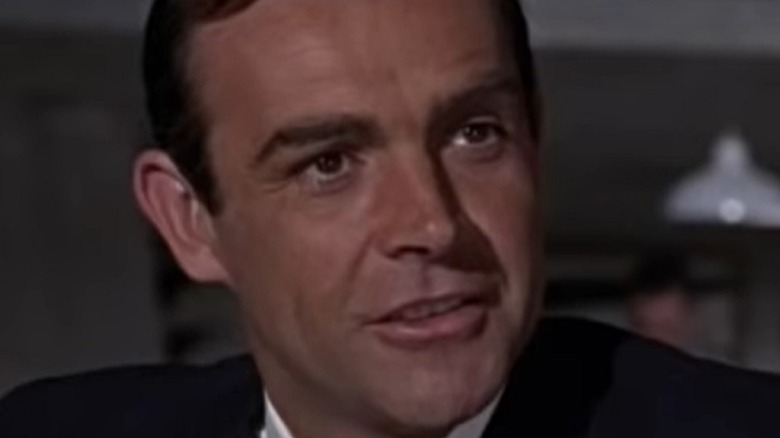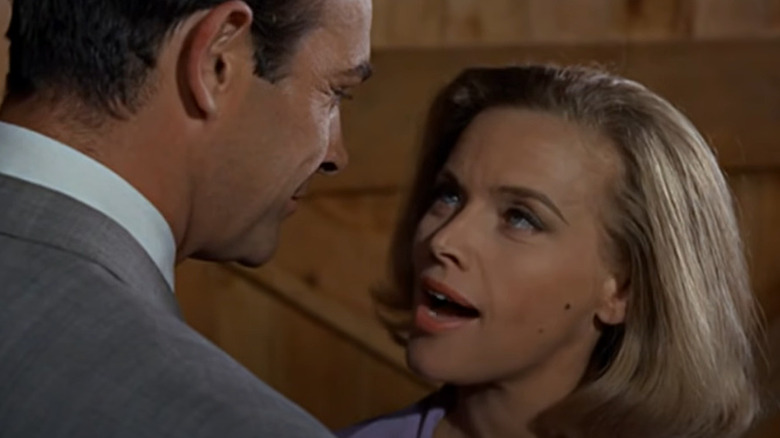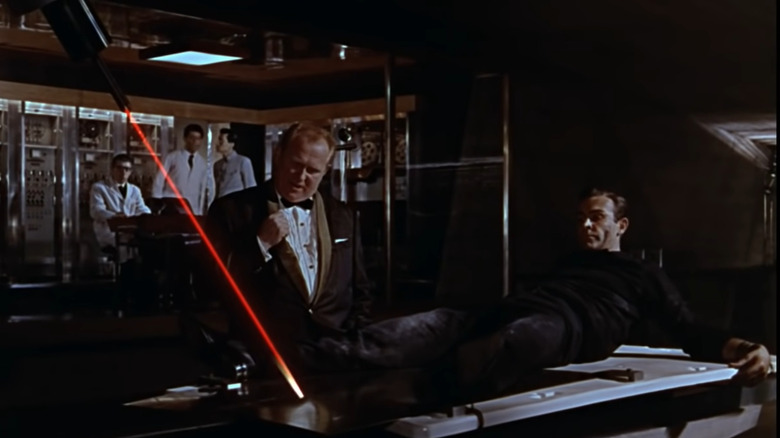The Goldfinger Scene That Aged Poorly
The "James Bond" franchise has a famous (or infamous) scene for just about every occasion, from the casino to the beach. It's been that way since the beginning: Who could forget the cult scene from the first Bond movie, "Dr. No," in which Connery's Bond meets Honey Ryder (played by Ursula Andress) on a mesmerizing Jamaican beach after she emerges from the ocean with a seashell in each hand?
While Ian Fleming's eponymous novel was actually his sixth featuring the MI6 agent, "Dr. No" was the first time we saw James Bond on the silver screen. Many years have passed since Terence Young directed that inaugural Bond film in 1962, and in 2021, we were lucky enough to enjoy the 25th official installment (via Variety): Cary Fukunaga's "No Time to Die," with Daniel Craig in the role of 007.
Without a doubt, when we look back on such an expansive catalog, it's clear that some scenes have aged better than others. And one of the worst offenders comes in the third movie of the series, 1964's "Goldfinger." This film features plenty of enduring moments, such as Shirley Bassey's unforgettable opening song, and many critics and fans consider it Sean Connery's best "James Bond" movie. It even boasts the now-iconic dialogue during which Bond asks Goldfinger, "Do you expect me to talk?" as Goldfinger's about to slowly bisect him with a laser. The villain retorts, "No, Mr. Bond, I expect you to die!" But for all its popularity, the movie also showcases certain elements of this celebrated character that are better left in the past.
James Bond forced Pussy Galore to kiss him after a short fight
As in "Dr. No," the great Scottish actor Sean Connery played the role of 007 in "Goldfinger." In the latter movie, Bond discovers a gold tycoon's plot to raid Fort Knox and does all he can to stop it (and save the world in the process, of course). But as Cary Fukunaga, celebrated for directing the first season of HBO's hit show "True Detective" as well as the 2020s' first Bond movie "No Time To Die," points out: "basically Sean Connery's character rapes a woman" (per IndieWire). Fukunaga emphasizes that such a sequence simply wouldn't be acceptable today.
It really wouldn't. "Goldfinger" features a scene in a barn where Connery's Bond and Pussy Galore (Honor Blackman) start fighting after Galore rejects Bond's advances. She's simply not interested. Then, after a short but intense fight -– Bond even throws Galore over his shoulders and into the hay –- he gets on top of the woman and forces her to kiss him by pinning her down. He does all this with confidence and no remorse despite her repeated protests. Consent is not a code phrase to decipher, and it's clear that she never offers it in this poorly-aged scene that essentially condones assault.
If you or anyone you know has been a victim of sexual assault, help is available. Visit the Rape, Abuse & Incest National Network website or contact RAINN's National Helpline at 1-800-656-HOPE (4673).
There's no place for toxic masculinity in James Bond's future
The actor who played the role of 007 beginning in 2006, Daniel Craig, thinks that Bond is "actually a misogynist" (per Time), and he might not be wrong. But even though many believe that James Bond's masculinity can be destructive and excessive – after all, you'll even find a list of Bond's best scenes ranked by masculinity — not everything is as dark as it seems. Those involved in the franchise have taken steps to remedy its sexist and otherwise prejudiced offenses.
Revisiting scenes like the barn in "Goldfinger" has inspired directors like Fukunaga to "do the work to make the female characters more than just contrivances" (via IndieWire) and to examine the way Bond functions in the world with the aim of deconstructing his often harmful brand of masculinity. CNet even reports that in "No Time To Die," we might have also seen the first openly gay character in the franchise: When Bond and Moneypenny go to Q's house unannounced, Q, played by Ben Whishaw, is making dinner for two — and he refers to his expected guest as a "he." Maybe there's still hope for this "misogynist dinosaur," as The Irish Times and even Dame Judi Dench's M call Bond, to change his outdated ways and views on women and gender.


